Gibson Island Sailors Among Group Successfully Crossing the Atlantic and First To Finish in Class
When a dozen bluewater sailors, including four from the Gibson Island Yacht Squadron (GIYS), crossed from the Canary Islands to the Caribbean with the Atlantic Rally for Cruisers (ARC) last fall, not only did they cross the line first in their class, but they also celebrated the magic of a cohesive crew ending a long offshore sailing journey. SpinSheet asked GIYS sailor Byrne Murphy several questions about their journey:
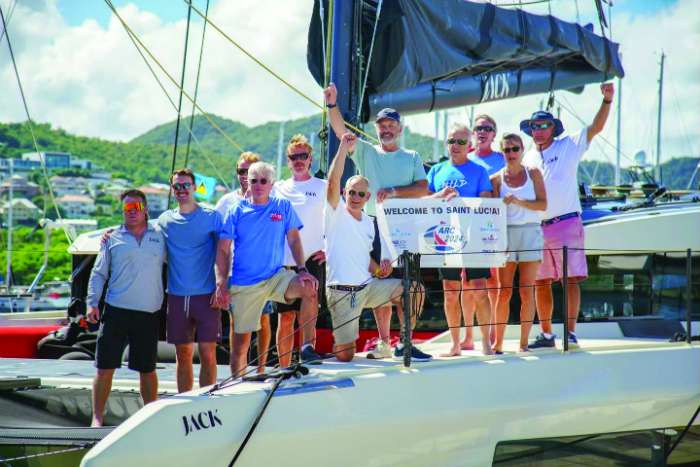
How did the idea of doing the ARC originate?
Byrne: Upon graduating from college in 1981, I fulfilled a lifelong dream of long-distance bluewater passagemaking. I sailed from Marblehead, MA, to Auckland, New Zealand, by way of the Panama Canal. The goal was to visit as many islands and archipelagos as possible, to not be in a big hurry, and to follow the trade winds all along the way. I earned my way around the ocean.
The voyage took 16 months, included working on five different boats, and was full of adventure and mis-adventure (man-overboard after leaving the Marquesas Islands; surrounded by hammerhead sharks in Isola del Cocoa off of Costa Rica; and tracked and followed by armed drug runners in the Straits of Florida). My voyage was meant to be continued around the world, but illness cut it short when I was in New Zealand. Upon arrival back in the US, I vowed that I would extend that cruise by crossing the Atlantic. Forty years later I thought doing so in my own boat in the ARC would be a fun adventure, so I did it.
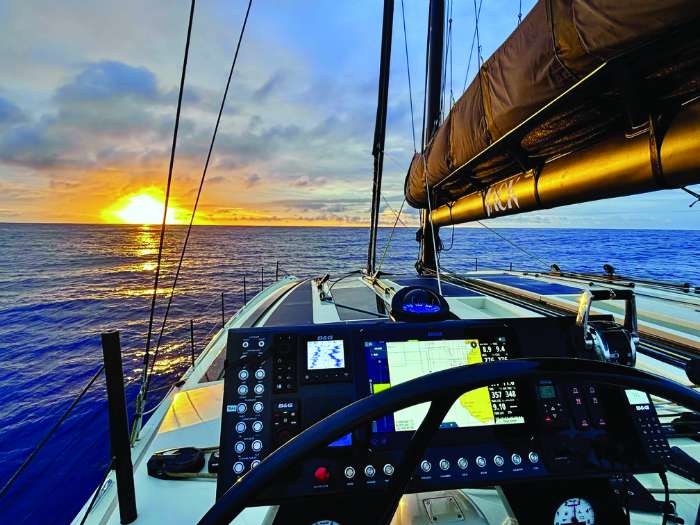
Tell us about your boat.
After researching the challenges of shipping my Gibson Island-based boat, Andiamo, a Gunfleet 58, I elected to charter a boat for the ARC if I could find an interesting one. I chartered Jack, a McConaghy 75 catamaran, the first of its kind and size by McConaghy. To be sure she would be the right boat for the ARC, I chartered her during the summer for a trial run. I did so in Greece last June and decided it was a go for the ARC.
Who were your crew members?
Byrne Murphy (GI), Mike “Micky” Broughton (Italy), Will Passano (GI), Geb Cook (Fishers Island, NY), Drew Nicklass (Wales), Tige Savage (GI), Morgan Hayes (captain of Jack, Thailand)), Quent Chafee (Rhode Island), Cam Chafee (Rhode Island), Liam Murphy (GI), and Rachel Trevallion (chef, Italy). In addition to relevant bluewater sailing experience, I deployed three other criteria for crew selection: 1) generosity of spirit—that’s what makes the long nights, bad weather, and breakages not only bearable but incredibly fun; 2) an unmistakable track record of commitment to teamwork; and 3) a sense of humor. All selected crew members had those characteristics deep within their DNA. It made a huge difference. As we said, “Culture eats strategy for lunch.... every time!”
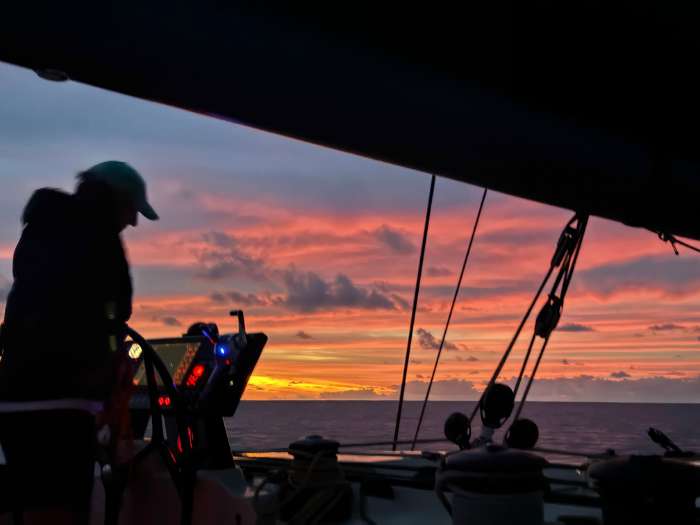
Tell us about your conditions at sea.
The trade winds did not fill in right away, so it was quiet for a few days. Consequently, we were headed north and in fact were the only boat that went up north-northeast “wind hunting.” We detected a front approaching a few hundred miles away. If we had not done that, given we were so much heavier than the smaller boats, we would not have done so well. There were squalls, sometimes with quite high winds (50-mph gusts in some cases; hence the very sad and tragic event on Ocean Breeze), but in general those squalls were short-lived and manageable if you had an experienced crew.
Did anything surprising happen along the way?
The most critical experience all along the way was the magic of the crew’s cohesion… Beyond the selection process (already noted), it boiled down to creating the right culture, right from the start, even during our Zoom calls leading up to the race.
Did the boat handle conditions to your satisfaction?
Jack handled very well overall. She was designed to sail fast and comfortably off the wind. The race was mostly well off the wind (140 to 150 degrees), whereas if we had been able to sail her at 120 degrees, we’d have reached much higher speeds. Our top speed was 17.5 knots.
Did you eat well?
We dined incredibly well because we put a strong emphasis on it. I hired a full-time chef for the race (Rachel Trevallion). Rachel orchestrated approximately 600 meals in the 14.5 days and nights at sea. A remarkable feat, with almost no freeze-dried components and a lot of fresh food throughout. We brought aboard four extra coolers to handle the volume of fresh food. The meals included a special Thanksgiving Dinner, complete with all the fixins. We also had a mid-Atlantic special dinner—all to keep spirits up and energy flowing. (Sidebar: We also had a long running backgammon tournament nearly the whole race; certainly over 100 games of backgammon were played.) Lastly, each dinner featured one of the crew telling stories of his or her background, or sailing stories, or history tales relating to our trip or similar trips.
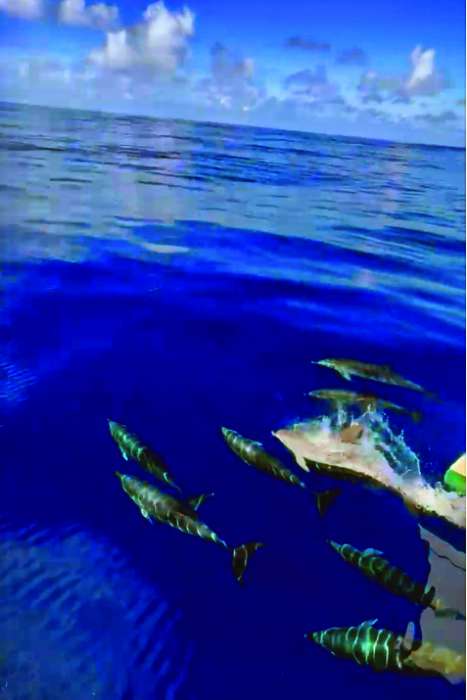
Any memorable wildlife sightings?
Whales on two or three occasions, but never too close or threatening. Schools of dolphins swam with us on several occasions. Not so many birds; the usual complement of flying fish. There was no moon for most of the passage, but we often enjoyed an incredible carpet of stars across the sky. The Milky Way was bright and seemingly unlimited in scope, but it was only part of the sky—the stars and planets were everywhere. Most nights we had Polaris to the north and the Southern Cross. We did have one nighttime shocker when the French government launched a massive rocket out of French Guyana.
How were the shoreside events on both sides?
There were many events of all sorts, including educational seminars on sailing/racing, weather forecasting, or repairing the engine, sails, or winches. There certainly were many social events, and many sailors obviously knew each other from prior cruises or ARCs together. There was plenty of good spirit dockside.
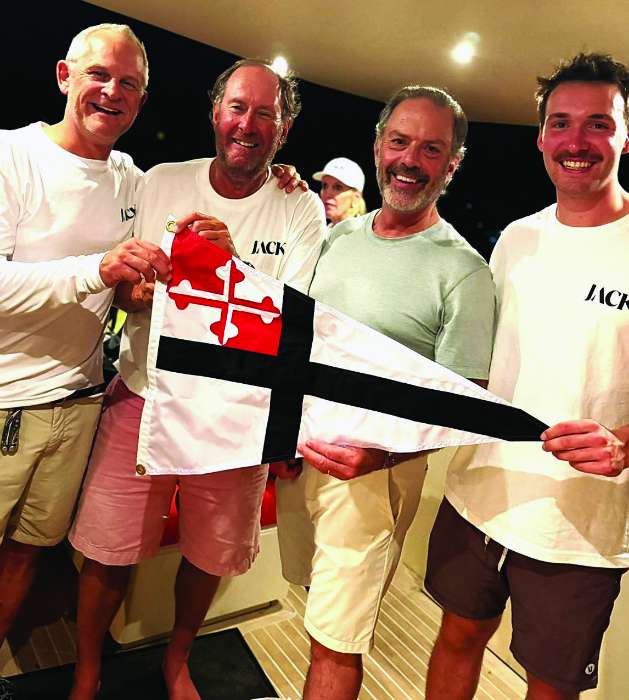
Would you recommend the ARC to fellow sailors?
Yes, certainly I would. My caveat is to be sure they know what exactly the ARC is all about and how it differs from traditional RORC ocean racing. Those differences aside, to be able to cross the Atlantic in a community of boats, nearly all of them sailing with a real community spirit, and all combined with trade winds and beautiful days and nights out on the ocean: that is magic. Pure magic.
What else should we know?
Sailing is good for your soul, and long-distance bluewater sailing is the most pure. But, as always, be properly prepared. It is still an ocean crossing.
Learn how you can join a rally: worldcruising.com.
Find more offshore sailing articles here.




